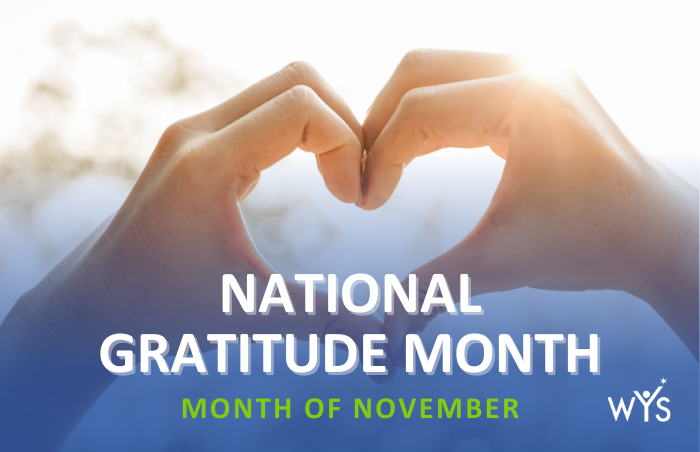
November is known as the month of giving thanks which is fitting because it is also the time of year in which we celebrate National Gratitude Month. This month is a time dedicated to recognizing the power of gratitude and its profound impact on youth mental health. Gratitude goes beyond just a simple expression of thanks. Practicing gratitude can be transformative, especially when it comes to youth mental well-being, and can serve as a powerful tool for building resilience in the face of challenges – particularly for youth dealing with Adverse Childhood Experiences (ACEs).
The Connection Between Gratitude and Mental Health
Research has shown that practicing gratitude can inspire various mental health benefits, including increased happiness, reduced anxiety, and improved overall well-being. But for youth who have experienced trauma or adversity, like ACEs, cultivating gratitude can be particularly impactful. Studies suggest that young people who regularly engage in gratitude practices may experience greater emotional resilience, allowing them the chance to better navigate life’s challenges.
According to the American Psychological Association, engaging in positive psychological exercises like gratitude can improve mental health outcomes for youth, especially those at risk due to early trauma. These practices not only improve youth mental health, but they can also mitigate the long-term effects of ACEs, offering a sense of hope and healing during formative years .
Building Resilience Through Gratitude
When youth experience adversity, such as neglect, abuse, or household dysfunction, their mental health can seriously suffer. This typically leads to mental health conditions like anxiety and depression. The good news is that resilience can be strengthened through intentional practices, including gratitude exercises. By fostering a gratitude mindset, youth learn to reframe their experiences, focusing on the positive aspects of their lives despite hardships.
Gratitude Exercises to Support Mental Health
Looking for ways to help youth practice gratitude and improve their mental health? Here are a few simple but effective exercises:
Gratitude Journaling – Encourage youth to write down three things they are grateful for each day. This practice helps shift focus from challenges, to positive aspects of their lives. For more tips on gratitude journaling, check out this resource from Positive Psychology here.
Acts of Kindness – Performing random acts of kindness can create feelings of gratitude and connection with others, which is essential for mental well-being. New research has found that performing acts of kindness may help reduce symptoms of depression and anxiety. Discover ways in which kindness can be practiced here.
Mindful Gratitude Practice – Teaching youth to take a few moments each day to sit quietly and reflect on something they appreciate can help reduce anxiety and promote a sense of peace. Learn more about explaining mindfulness to children here.
While many young individuals face adversity and challenges, the sheer power of gratitude offers a pathway to healing and resilience. By incorporating gratitude into daily life, we can help youth build emotional strength, foster positive mental health, and create a sense of hope for the future. Gratitude, in its simplest form, reminds us all that even in the face of difficulty, there is always something to be thankful for.
Resources for Further Support
At Western Youth Services (WYS), we understand the importance of supporting youth mental health through a variety of programs and services. Whether your child is struggling with trauma, anxiety, or other mental health challenges, our team is here to help. Explore our services and programs that promote resilience and healing, including:
WYS Mental Health Services: Offering counseling, mental health assessments, and support for youth and families. Learn more here.
BHTC (Behavioral Health Training Collaborative): Providing mental health trainings and resources for educators, parents, and community members. Find more information here.
For additional external resources, check out these other options:
National Alliance on Mental Illness (NAMI): Offering mental health education, support, and resources. Visit NAMI here.
Youth Mental Health First Aid: Training individuals to recognize and respond to youth mental health challenges. Learn about Youth Mental Health First Aid here.
Let’s embrace the power of gratitude this National Gratitude Month to promote healing, resilience, and brighter futures for our youth.
If your child or a young loved one is struggling with a mental health concern, we encourage you to reach out to a mental health professional or to contact an Access Coordinator at Western Youth Services by sending an email to [email protected] or by calling us toll-free at 888-312-0406.
Orange County, State and National resources can be found on our site here: https://www.westernyouthservices.org/resources/.






